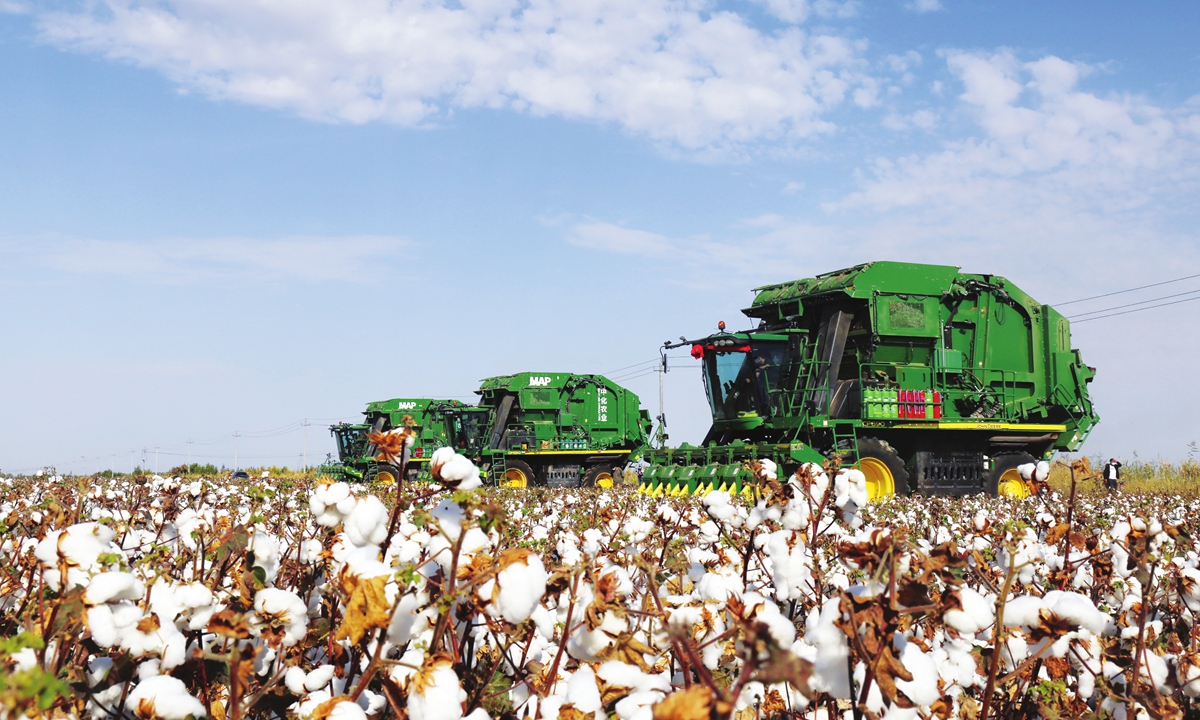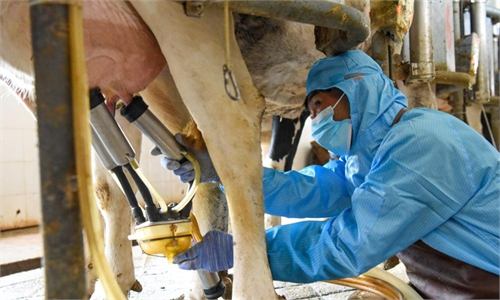
Photo: VCG
Editor's Note:Some Western politicians and media have been attacking and smearing Northwest China's Xinjiang Uygur Autonomous Region, with disinformation and demonization such as "genocide." Maureen Huebel (Huebel), a Melbourne-based scholar who plans to conduct field research in Xinjiang next year, has been the target of online harassment for challenging Western narratives about Xinjiang. Recently, 11 Chinese universities and research institutions voiced their support for her planned research in an open letter. Huebel shared her feelings about the support she gets and her perception of Western narratives about China with Global Times (GT) reporters Wang Wenwen and Wang Zixuan.
GT: How does the online harassment you have experienced tell about the opinion environment regarding Xinjiang? What do you think of the support lent to you by some Chinese institutes?
Huebel: There is a feeling of fear and upset about talking about Xinjiang in Australia. I can see that the opposing view has become pervasive in Australia, predominantly by the lack of rigor of checking sources and providing substantiation to support the claims being made. I have requested evidence on Twitter and I am still waiting for that evidence. That's why I feel I need to go to Xinjiang to see for myself.
I think we need to be able to discuss what happens in Xinjiang openly, without being subject to personal abuse. That's what free speech and academic freedom are all about.
The Australian public is left with no evidence or rationale for the claim of Uygur detention. Most people seem to believe the Western narrative. Sanctions on the Xinjiang cotton growers have only put the cost of cotton garments up in Australia. Sanctions have a way of backfiring. I want to find out for myself as the parameters don't stack up.
Xinjiang's GDP appears to have bounced back since the imposed sanctions by doing business with other countries. In Australia we have been short of cotton products which were once readily available. That is a big problem from a forensic point of view.
GT: What can Australia learn from the achievements of poverty alleviation in China?
Huebel: Australia absolutely needs to learn how to relieve poverty. I go to the city on the train and see people going in circles on heated trains to get relief from the cold and wind. I go to sit down on a railway seat at the station and I get startled as a body moves suddenly huddled from the cold in dirty unwashed clothes. Is he hungry? Is he sick? Does anybody care?
GT: What is the root cause of anti-China narratives in the West?
Huebel: Anti-China narratives start in the US. Australia follows. Vilification can be used as a means to manufacture consent for war, to create hatred and make the opponent evil. Australia does not seem to learn that war does not serve us. Afghanistan was 20 years of war with destruction for everyone concerned. Our returned injured soldiers from Afghanistan now live on the streets of Melbourne suburbs.
Anti-China narratives are based on fear. The US is threatened by the fact that China leads in 37 out of 44 critical technologies, according to the Australian Strategic Policy Institute in one of its recent publications. The West feels fearful of China's economic growth.
The US is trying to keep its hegemony by using economic sanctions on China. The US talks of "national security" when they sanctioned Huawei, but when the Chinese government states that there are "serious network security risks" to China's information infrastructure and affect its national security when it bans products of US chipmaker Micron, then the US states that China is limiting free trade.
What will China do with its growing economic power? The US projects its own economic sanction practices onto China, implying that China will do the same and then shudders. There is no evidence that China will use its economic power in the way that the US has used since WWII. China has a philosophy of "common prosperity," assisting countries to become more productive, build infrastructure that can help their standard of living. The US and US investors in other countries have focused on their own self interest which is a different and opposing view to helping other countries improve their standards of living and encourage more cross-country trade, for example the premise of the Belt and Road Initiative.
The West likes to feel free and criticizes "Chinese authority" or "Chinese repression" without any study or understanding of a different culture or system of government. The West has lived and died for its democracy and can't entertain any other form of government. It does not attempt to understand the strengths and weaknesses of different government styles or analyze changes that could make it a government of action rather than a government of argument.
The West uses a popularity contest rather than meritocracy. There are few think tanks that take government to new levels of productivity, holding a strategic view of a better future. There are no long-term government goals as a term of office is only a few years. This is partly why Western democracies are falling behind in technological advancements but still believe they have the very best political system without any need to reflect or adapt to changing circumstances. The West is having difficulty in realizing that it no longer leads the world in many areas. It is like: "How dare China get ahead of us!" This is an air of indignation by these democracies.
GT: What do you think of the ups and downs of China-Australia relations? What are the major challenges for the bilateral relations?
Huebel: The ups and downs of our relationship with China are dependent on pressure from the US. The US says "you are either with us or against us." They are simplifying the decision to a binary choice. Well, life is not so simple. There are many shades of grey and Australia should find its own feet on this spectrum and have its own view. The US promulgates the myth that China will eventually take over Australia and provides comfort to people who believe this. The West has great difficulty in observing China leading in many fields - some significant areas of medical research and success with cancer treatments, technology advancements, infrastructure building methods, especially advanced bridge-building methods.
Australia follows the US for "security" but at times sits on the fence as Australian and Chinese economies are interdependent, and being rude and aggressive with China costs Australian exports. Australia is more reliant on China than China is on Australia.
The statement that China is our greatest threat has no basis in evidence or rationale. This is the angle that Biden pushes on the West fear-mongering. The US leads in military power but the standard of living is dropping in the West, poverty is growing and homelessness is increasing. It is heartbreaking to see so many people living on the streets - such terrible human suffering in the so-called rich Western countries.
Australia needs to recognize that China is a better friend than a foe. The warmongering US just wants to sell us weapons and submarines which we cannot afford. Biden can't even remember the name of our prime ministers. It is strange that someone so cognitively impaired can be so sure that war in Ukraine and war in the Taiwan Straits are necessary and diplomatic dialogue is not his first choice.
GT: What would you like to say to people like you who are seeking the truth?
Huebel: I ask people not to have a prejudice against any country or race and there is no need to single out China as the G7 did by stating it as a threat. One must actively analyze and think without bias to allow oneself to marvel at the real accomplishments that China has achieved in a relatively short time in history.



